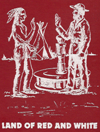 A FURTHER LOOK AT THE SITUATION (FROM THE WRITINGS OF R.D. SYMONS)
A FURTHER LOOK AT THE SITUATION (FROM THE WRITINGS OF R.D. SYMONS)
as published in the Western Producer in 1973 and 1974
"Still the Wind Blows" is a historical novel of the Canadian Northwest from 1860-1916. Part One, Chapter 1, concerns the District of Assiniboia, Northwest Territories, Canada, 1873. The first excerpt deals with the thoughts of the Cree in camp as they watch the approach of an unknown cavalcade. The second explains Constable Curtis' mission to Poundmaker. The third excerpt tells of Curtis' foster brother, Arrow Boy, named Seeking Star after he had gone out alone at night to make his medicine.
Part One, Chapter 1
"Wah.' Perhaps the younger Chief, Poundmaker, was of weaker stuff - too much given to wise talk and peaceful gestures. Had he not gone so far as to say in council that the Blackfoot were the brothers of the Cree? That if strife between them did not come to an end they would all - Blackfoot, Blood, Sarcee, and Cree together - be eaten up by the Long Knives, besotted by their whiskey and robbed of all they had? Tapway! Such were the goings on below the Medicine Line. And what of the White Mother, the Okinowsquayo? - She was too far away, they said; the wind had stopped her ears. The Black Robes called the red men sons and brothers, but had no stomach for war. The Company men thought only of beaver, beaver and more beaver - what cared they whether the beaver had been trapped by their rightful owners or by the treacherous Long Knives, who so soon, it was said, must invade their trapping grounds?
And the White Mother had no soldiers. It had been said that some men with red coats had come to Fort Garry to bring order to the whites many moons ago, but who had seen them? And might they not be as bad as the Long Knives, despite that their coats were red instead of blue? The Indians of the plains had best look to themselves, Poundmaker had said. Long ago, far to the east, the Warden of the Plans had attempted to keep back the covetous tribes from the south, ever pushing north as the shortage of buffalo and the guns of the Long Knives pressed them."
"When threats failed the Long Knives made promises, but they spoke always with forked tongues, and only the foolish could believe them. Time and again the White Father had made treaties with the plains tribes - always to break them when the promised lands of those tribes gave evidence of good grazing or the yellow copper "that makes men mad"."
"And the buffalo, once as many as the grains of sand in these rolling hills - tapway, the buffalo, though the gift of the Manito to his children, were being slaughtered. Of what value to the Long Knives could the Pewabskiwis-o' miskano - the road of metal - possibly be, comparable to the loss of buffalo and disruption of the grazing grounds brought about by its building?"
"Perhaps Poundmaker was right. Perhaps he might be able to make peace among the Indian tribes, and by opposing a solid front to the encroaching whites, at least insure that the rightful owners of the plains be not picked off band by band, and tribe by tribe.
If these things came to the land of the Cree, was it not the young Chief Wandering Spirit who had so brashly said before the older and wiser ones at the last council, "I, Wandering Spirit, say that it were better to die as a warrior than starve as a cur.' "
CHAPTER VI - 1885
"To Whom it May Concern,
This is to certify that No. 29179, Const. Curtis, J., North West Mounted Police, on a special mission, is to be provided with all reasonable facilities at all times, including rations if needed, and is not required to answer questions as to his movements or activities.
Signed, Edgar Dewdney,
Lieutenant-Governor, North West Territories. Signed, H.E. Weatherby, Captain
Military A.D.C. to His Honor, etc.
Sealed at Regina, April 11, 1885"
"You are to be my personal representative to Poundmaker. Poundmaker is a good friend of mine, and he is in a bad position. There is a force under Colonel Otter heading for Battleford. He will probably reach that point shortly."
"The whole object of this - er - exercise, Curtis, is to keep the Cree quiet, and I am betting on the fact that one man who they trust can do this more effectively than a troop of men they don't."
His Honor rose. "And now we will leave you with Mr. McDougall for a few moments before lunch"
When the two men left, McDougall said, "Sit down again, John. We haven't much time. Father Lacombe and I are to go ahead of Strange's column to Edmonton, and to see Chief Seenum. It's likely I'll stay with the column as chaplain, so if we come down the Saskatchewan I may see you before too long."
"But this may be a long goodbye, John. Only a fool would not face that possibility. As your teacher, almost your father, I remind you of this - you are never alone, never alone. Let us bow our heads in prayer."
The young head and the old almost touched. After a moment's silence McDougall spoke. "Heavenly Father, maker of history, hear, we beseech Thee, our prayers for all people, that they may be slow to anger, quick to forgive; that our land of Canada may be free of racial strife and indifference and suffering; that in the councils of the mighty no less than in the tipis of the humble Thy healthful presence may subdue the spirit of the proud and imbue with wisdom the minds of the great.
`We ask Thee also for Thy continued presence in our own hearts. We ask that this Thy son may go forth in the breast-plate of righteousness and carrying the sword of truth, and that we who are Thy servants may have prayed worthily.
`And we ask this in Jesus' name, Amen.
"And now, John, I have little fear for you. Dewdney will back you to the hilt, for he is an honorable and just man - even although we all know he is inclined to be parsimonious, as you will have seen just now.' The virtue of thrift, John, sometimes works that way.' "
CHAPTER VIII - 1885
Nine years ago he had followed the band to the Saskatchewan, to a place called Fort Pitt by the white man, and there had been police there, and many big Okimows of the whites, and one of the Ottawa Fathers, and all the big chiefs of the Cree and Stoney - Sweetgrass and Little Pine and Thunderchild and Grizzly Bear's Head, and many others he did not know - and they had signed the treaty.
And from far northwest had come Chief Seenum of the Woods Cree, called Pecan, the Hazelnut. He was different, more like a Hudson's Bay man. He didn't think so much of hunting, and said his people liked to dig up the ground and grow things. Doubtless game was, scarce in Seenum's country, Seeking Star had added.'
THE PLAINS CHIEFS
Big Bear has often been labelled "the troublemaker." He was, as William Cameron said, an eloquent, impressive speaker, and "an uneducated statesman." He was a man of action, for it is told that when the railroad survey was being made through the south of what is now Alberta and Saskatchewan, he pulled up the stakes. Steele felt that Big Bear's band required one hundred armed, mounted men nearby all the time. These men were not nearby, when, at Frog Lake, the men of Big Bear's band were "past obeying any voice."
Poundmaker was named "Noble Chief of the Crees" by Alberta author Grant MacEwen. He seems to have acquired his name because of his skill in drawing the buffalo into pounds using a buffalo robe covering and a bell. He felt that his people had been wrong in accepting the whiteman's idea that the Indians' God was no longer able to care for them. They had traded their food, clothing and freedom from sickness for hunger, disease and death. Poundmaker said that the buffalo would return, and his people would be able to go back to the way they were intended to live.
It was said by some that he had European blood. Wandering Spirit felt so strongly about the ball and chain on his leg. Poundmaker felt just as strongly about his two long braids. He was allowed to keep his hair as it was.
It would also appear that even when Poundmaker's men were no longer attacking, Colonel Otter was bent on teaching them a lesson. All this after the chief had left Otter's men a way of retreat at Cut Knife Creek and hadn't let his men pursue the troops.
In a letter to Middleton and Otter Poundmaker said he had heard of Riel's surrender by the "grapevine", so to speak, but not by any definite communication. He wanted surrender terms sent in writing, so there would be no misunderstanding or trouble. He had twenty-one prisoners, which he said had been well treated. The letter was signed, "With respect." While he waited for a reply, he freed the prisoners and had them escorted to Battleford.
Middleton, on the steamer Northcote, sent a reply which seemed to show unnecessary contempt, since the chief had already agreed to surrender. The military leader used words such as "utterly defeated" and "no terms." He stated that he had enough troops to whip the Indians or drive them to starve. He promised to do this if Poundmaker didn't return the teams he took and bring the band's weapons into Battleford on a certain day. He seemed to soften a little as he expressed pleasure at hearing of the prisoners' release.
Some people felt that the chief should have been treated better. Among them was Father Cochin, who testified on Poundmaker's behalf. He said that the chief's conduct merited thanks, not jail. Poundmaker expressed a preference for hanging rather than jail, but this was not to be granted.
In February of 1886 Erastus Wiman, in a note to Prime Minister John A. Macdonald, asked if he could put Poundmaker on display as Sitting Bull had been with Buffalo Bill's Wild West Show. Wiman felt that four or five years of this would render Poundmaker "innocuous" (harmless.) His request was denied.
After his death, while visiting Crowfoot, Poundmaker was buried on the Blackfoot Reserve. In Centennial Year, 1967, Cree Indians moved his bones to the Cut Knife Reserve. A plaque honoring him was to be erected by the Historic Sites and Monument of Canada. Like Riel, and others, his life has been re-examined, and he has been seen in roles other than that of the villian.
Fine Day was an Indian who was little heard of. He, as a member of Poundmaker's band, seemed to be the general who masterminded the Cut Knife strategy. He was so honored in Poundmaker's camp that others walked back of him in council, never between him and the fire - not even a chief!


